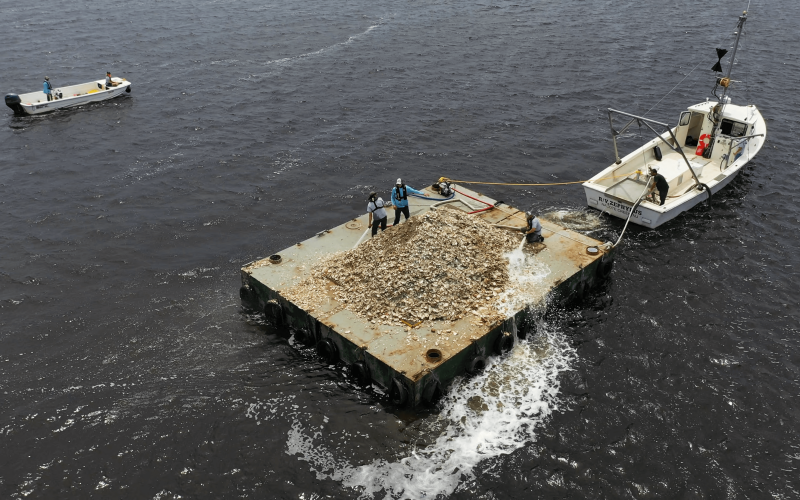The New Jersey Division of Fish and Wildlife has reported that its clam and oyster shell recycling program has collected more than 100 metric tons of discarded oysters in the state this year for use building oyster reefs.
“Shell recycling is a practice where restaurants save discarded shells from their seafood dishes,” Scott Stueber, a senior fisheries biologist with the wildlife division of the state Department of Environmental Protection, said in a video explaining the progress the project has made. “Each summer, our staff reuses the collected shells to enhance natural oyster reefs by providing the substrate they need to grow and succeed.”
Traditionally, companies discard oyster and clam shells and bring the waste to landfills, but through the program, partnering companies separate the shells from the normal waste stream into organized buckets, which the DEP collects weekly.
The shells then go to the Nacote Creek Research Station in Galloway Township a few miles north of the city, where they are stored and cured. The curing process entails the shells sitting for at least six months before crews place them back into the water, removing the possibility of harmful diseases being introduced to oyster reefs.
Once the shells are ready to enter the marine environment, they’re shot through high-pressure water cannons into ocean reefs along the New Jersey coast from a barge, with a primary focus on stocking reefs in the Mullica River in southern New Jersey. The Mullica and southern Barnegat Bay-Great Bay estuary is one center for a growing rebirth of the state’s historic oyster industry.
By recycling the oyster and clam shells, restaurants and casinos save money, help eliminate waste from landfills, and contribute to local oyster populations, the DEP stated.
“It’s a great program,” Hard Rock Casino Executive Chef Jeffery Slotterback said. “It’s an easy way to give back, and it’s a lot better than dumping your oysters and clam shells in the trash; it's going to a great cause. We’re all looking to sustain an industry and be responsible about it, and this is probably one of the best ways to go about it.”
This past year, the program expanded to include eight new restaurants and casinos in the Atlantic City area, including Dock’s Oyster House, Dougherty’s Steakhouse and Raw Bar, The Knife and Fork Inn, Hard Rock Hotel and Casino, Borgata Casino, Golden Nugget Casino, Resorts Casino, and Tropicana Casino.
“We’ve been a part of the shell recycling program for quite a while now,” Dock’s Oyster House, The Knife Fork and Inn, and Dougherty’s Steakhouse and Raw Bar Owner Frank Dougherty said. “I just found out we’ve recycled 30 tons of shells this year alone, just at Dock’s, which is an amazing number. If anybody out there has oysters or clams on their menu, I fully encourage you to get involved in this program. The guys are great to deal with. They come and collect; it’s 100 percent a win. There’s no downside to this.”
The program, which began in 2019 through a partnership between the DEP Marine Resources Administration (MRA), the Jetty Rock Foundation, the Rutgers University Cooperative Extension, and Stockton University, received initial interest from the Hard Rock Hotel and Casino before expanding out to its current portfolio of partners.
“Think about what [100 tons] means to the environment and our impact on it,” Hard Rock Casino Director of Culinary Services Jeff Braun said. “It’s an amazing amount. We’re proud to partner with New Jersey Fish and Wildlife … and we’re looking forward to [continuing in our efforts] in saving the planet.”
This story originally appeared on SeafoodSource.com and is republished here with permission.






